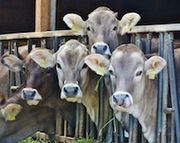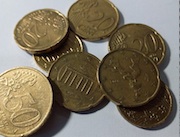EMB Newsletter October 2016
Newsletter as PDF
Contact
EMB - European Milk Board asbl
Rue de la Loi 155
B-1040 Bruxelles
Phone: +32 - 2808 - 1935
Fax: +32 - 2808 - 8265
Dear dairy farmers and interested parties,
It's a choice
“For the first time in my career as a milk producer, I can choose how I want to cope with a low milk price: I can choose to milk more and obtain a cash flow or I can choose to participate in the European Commission's programme, reduce my milk production and still get a little bit of money for my effort.”
These wise words were spoken by the president of one of the EMB member organisations and illustrate the significance of the new crisis instrument introduced by the European Commission to boost the still sinking milk price for milk producers. He is right - for the first time, milk producers have a choice about how to react to a very low milk price.
Many European milk producers have made a conscious choice. Even before it has entered into force, this instrument has had a psychological effect on the market: Immediately after the European Commission published the intention to introduce this bonus for milk production reduction, market prices reacted in a positive way. Exactly as EMB predicted they would. The market is ruled by economics, but also by emotion, and the knowledge that less milk will be available on the market in the coming months is enough to change market sentiments and boost quotations.
Spectacular milk price increases for producers have already been announced for October (more than 4 cents). These price increases are, of course, more than welcome, but the speed of the price rise does raise questions. For instance: Ongoing contracts has always been the argument and the excuse for it to be impossible for milk producers to immediately benefit from higher milk quotations. Why does that no longer apply?
Only a few weeks ago, some dairy processors announced even lower producer milk prices for the coming months due to a market situation that was described as 'stable but not better'. What has changed?
Do the dairy processors have so little insight into the market? Or do milk producers have to face the fact that in this obscure system, a fair share of the margins have been withheld from them by processors for a very long time?
The European Commission is also breathing down the neck of dairy processors by investigating the distribution of margins along the dairy chain and this could also exert its influence.
The EMB lobby has played a significant role in these developments and we have achieved results: After the milk strike in 2008, a High Level Group on Milk was introduced, where the EMB demanded an investigation into the distribution of margins along the dairy chain - an investigation that is currently ongoing.
The lobbying over the last two years has been even more effective: The bonus for milk production reduction is an important element of EMB’s Market Responsibility Programme. The effectiveness of this feature was questioned and counter lobbied by the dairy industry and the traditional farmer organisations who are members of Copa Cogeca. They claimed that milk producers would never participate in a voluntary production reduction scheme. But they have been wrong: Milk producers have proven to be very willing to correct the imbalance in the dairy market if given the chance.
Milk producers not participating in the voluntary reduction scheme can also make the right choice and put their best foot forward by choosing not to increase production volumes while the reduction scheme is in operation. It is their opportunity to show that they are not egocentric free riders, interested in nothing but personal gain, and that they understand the responsibility that comes with the advantages of a Common Agricultural Policy. It is a choice that would indeed highlight the positive function of the European Union.
As the EMB has proven its well-informed vision and ability to best reflect the mind-set of milk producers, it would make sense for the European Commissioner for Agriculture to consult the EMB on the path to follow in terms of market management. We need an instrument that makes it possible to control the degree of milk price volatility for producers.
A fair price for producers is the only way to guarantee food security and to end exploitation and abandonment of the sector. It is a choice worth making.
Sieta van Keimpema, vice president EMB and president of DDB Netherlands
98.9% of EU milk volume reduction already claimed
West African producers in dialogue with EU policymakers
Crisis? What crisis?
Agriculture market crisis hits machinery sales
Competition is tearing Europe apart
Milk prices by country - EMB milk price comparison October 2015 to July 2016
Don’t let neoliberal ideology undermine farmers’ existence
Impressum
European Milk Board asbl
Rue de la Loi 155
B-1040 Bruxelles
Phone: +32 2808 1935
Fax: +32 2808 8265
E-Mail: office@europeanmilkboard.org
Website: http://www.europeanmilkboard.org







